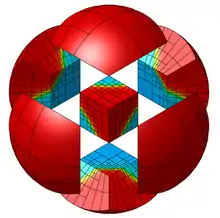MFEM
MFEM is an open-source C++ library for solving partial differential equations using the finite element method, developed and maintained by researchers at the Lawrence Livermore National Laboratory and the MFEM open-source community on GitHub. MFEM is free software released under a BSD license.[1]
 The logo of MFEM shows some of its features: curvilinear elements, adaptive mesh refinement and parallel partitioning. | |
| Stable release | 4.7
/ May 7, 2024 |
|---|---|
| Repository | https://github.com/mfem/mfem |
| Written in | C++ |
| Operating system | Linux, MacOS, Microsoft Windows |
| Type | Finite element analysis |
| License | BSD |
| Website | mfem |
The library consists of C++ classes that serve as building blocks for developing finite element solvers applicable to problems of fluid dynamics,[2] structural mechanics,[3] electromagnetics,[4] radiative transfer[5] and many other.
Features
Some of the features of MFEM include[6]
- Arbitrary high order finite elements with curved boundaries.
- H1, H(curl) and H(div) conforming, discontinuous (L2), and NURBS finite element spaces.
- Local mesh refinement, both conforming (simplex meshes) and non-conforming (quadrilateral/hexahedral meshes).
- Highly scalable MPI-based parallelism and GPU acceleration.[7]
- Wide variety of finite element discretization approaches, including Galerkin, discontinuous Galerkin, mixed, high-order and isogeometric analysis methods.
- Tight integration with the Hypre parallel linear algebra library.
- Many built-in solvers and interfaces to external libraries such as PETSc, SuiteSparse, Gmsh, etc.
- Accurate and flexible visualization with VisIt and ParaView.
- Lightweight design and conservative use of C++ templating.
- Documentation in the form of examples and mini-applications.
See also
References
- Auten, Holly. "The High Value of Open-Source Software" (PDF). Science & Technology Review. January/February 2018: 5–11.
- Anderson, Robert W.; Dobrev, Veselin A.; Kolev, Tzanio V.; Rieben, Robert N. (2018). "High-Order Multi-Material ALE Hydrodynamics". SIAM Journal on Scientific Computing. 40 (1): B32–B58. Bibcode:2018SJSC...40B..32A. doi:10.1137/17M1116453. OSTI 1474269.
- White, D. A.; Stowell, M. L.; Tortorelli, D. A. (2018). "Topological optimization of structures using Fourier representations". Structural and Multidisciplinary Optimization. 58 (3): 1205–1220. doi:10.1007/s00158-018-1962-y. OSTI 1479078. S2CID 126093513.
- Shiraiwa, S.; Wright, J. C.; Bonoli, P. T.; Kolev, T.; Stowell, M. (23 October 2017). "RF wave simulation for cold edge plasmas using the MFEM library". 22 Topical Conference on Radio-Frequency Power in Plasmas. 157: 03048. Bibcode:2017EPJWC.15703048S. doi:10.1051/epjconf/201715703048. hdl:1721.1/113307.
- Holec, M.; Limpouch, J.; Liska, R.; Weber, S. (10 April 2017). "High‐order discontinuous Galerkin nonlocal transport and energy equations scheme for radiation hydrodynamics". Numerical Methods in Fluids. 83 (10): 779–797. Bibcode:2017IJNMF..83..779H. doi:10.1002/fld.4288. S2CID 125947931.
- "MFEM Finite Element Discretization Library".
- "MFEM video: Advanced simulation algorithms for HPC applications". YouTube.
External links
This article is issued from Wikipedia. The text is licensed under Creative Commons - Attribution - Sharealike. Additional terms may apply for the media files.